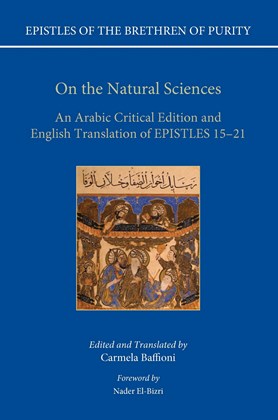On the Natural Sciences An Arabic Critical Edition and English Translation of Epistles 15–21
Oxford University Press in association with the Institute of Ismaili Studies
The Ikhwān al-Ṣafāʾ (Brethren of Purity), the anonymous adepts of a tenth-century esoteric fraternity based in Basra and Baghdad, hold an eminent position in the history of science and philosophy in Islam due to the wide reception and assimilation of their monumental encyclopaedia, the Rasāʾil Ikhwān al-Ṣafāʾ (Epistles of the Brethren of Purity). This compendium contains fifty-two epistles offering synoptic accounts of the classical sciences and philosophies of the age; divided into four classificatory parts, it treats themes in mathematics, logic, natural philosophy, psychology, metaphysics, and theology, in addition to didactic fables.
This volume comprises the initial seven epistles on the natural sciences, which correspond to the corpus of Aristotle’s great works on the philosophy of nature, whilst also incorporating an Islamic interpretation of Neoplatonic ideas. Besides providing the necessary references to works by Aristotle and other Greek authors, this book deals with various doctrines of Ismaili origin echoed in the treatises, foremost of which is the hierarchical representation of the three natural kingdoms, reflected in the hierarchy of human beings. The basis of human salvation is here seen in the relation between divine Artisan and human artisan, both of whom accomplish their works by actualizing their knowledge. Although moral behaviour is a necessary condition, salvation cannot be reached without a thorough knowledge of the sciences described progressively in the Rasāʾil Ikhwān al-Ṣafāʾ.
Acknowledgements
Foreword
Introduction
Technical Introduction
Epistle 15: On Matter and Form
Epistle 16: On the Heavens and the World
Epistle 17: On the Explanation of Generation and Corruption
Epistle 18: On the Explanation of Meteorology
Epistle 19: On the Explanation of Minerals
Epistle 20: On the Quiddity of Nature and the Quality of its Products
Epistle 21: On Plants
Appendix A: An Addition to Epistle 15
Appendix B: An Addition to Epistle 20
Appendix C: An Addition to Epistle 16
Bibliography
Subject Index
Index of Ancient Names
Index of Geographical Names
Index Locorum
Rasāʾil 15–21 (Arabic text and variants)
Arabic index
‘Camela Baffioni's translation is masterly and will prove a staple reference in scholarship on the Brethren.’
– Liana Saif, The Times Literary Supplement
‘The translation is distinguished by its clarity without any loss of precision, which makes reading it a pleasure. It is an admirable achievement that C. Baffioni was able to produce this volume of almost one thousand pages only three years after her edition of the logical parts of the Epistles. . . . A large number of scholars within and outside Arabic studies will be grateful for this solid foundation for future work.’
– Johannes Thomann, Journal of Islamic Studies
Carmela Baffioni is a Senior Research Associate at the Institute of Ismaili Studies, having previously been Professor of the History of Islamic Philosophy and of the History of Muslim Philosophies and Sciences at the University of Naples ‘L’Orientale’ until 2012. Her publications include several monographs on the transmission of Greek thought into Islam; translations of works by the Ikhwān al-Ṣafāʾ, al-Farābī, and Ibn Rushd (Averroes), as well as al-Shahrastānī; in addition, she has written a monograph on Aristotle’s Meteorologica IV (1981), and books on the history of Muslim philosophy. Besides the Ikhwān al-Ṣafāʾ, her articles focus on al-Kindī, al-Farābī, Yaḥyā ibn ʿAdī, Ibn Sīnā (Avicenna), Ibn Rushd (Averroes), and some Latin elaborations of Arabic heritage. Her scientific interests concern logic, atomism, and embryology. She has translated books from German and Russian, and edited six collective works. Her recent publications include articles on the political views of the Ikhwān al-Ṣafāʾ, the philosophy of nature of Ḥamīd al-Dīn al-Kirmānī, about forty items in the Enciclopedia filosofica (Milan: Bompiani, 2006), and the revision and edition of the catalogue of manuscripts of the Ahel Habott Foundation (Chinguetti), in Arabic and French (Milan: Nottetempo, 2006).

